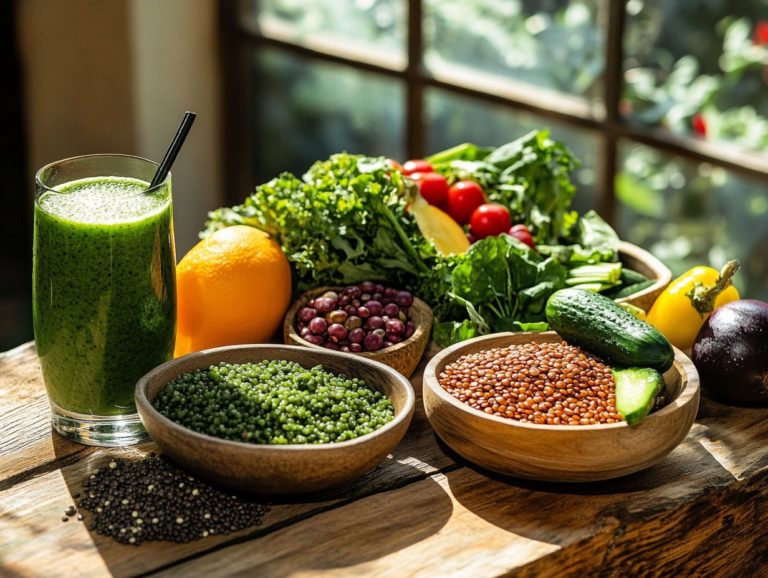Holistic Nutrition: A Guide for Busy Professionals
In today s fast-paced world, you might find that maintaining a balanced diet feels like an uphill battle, especially with your busy schedule.
Holistic nutrition presents a refreshing approach by highlighting the profound connection between what you eat, your mind, and your body. This article delves into the essence of holistic nutrition, showcasing its myriad benefits for your overall health and well-being.
It offers practical tips for seamlessly integrating these principles into your hectic life, discusses the essential components of a holistic nutrition plan, and guides you in crafting a personalized approach tailored to your unique needs.
Uncover strategies to tackle common challenges and transform your relationship with food today!
Contents
- Key Takeaways:
- Understanding Holistic Nutrition
- The Benefits of a Holistic Nutrition Approach
- Incorporating Holistic Nutrition into a Busy Lifestyle
- Key Components of a Holistic Nutrition Plan
- Addressing Common Nutrition Challenges for Busy Professionals
- Creating a Personalized Holistic Nutrition Plan
- Frequently Asked Questions
- How can busy professionals incorporate holistic nutrition into their schedules?
- Can holistic nutrition help with weight management?
- What foods are part of holistic nutrition?
- Can holistic nutrition improve mental health?
Key Takeaways:

Holistic nutrition is a well-rounded approach to eating that focuses on whole foods, mindful eating, and supplementation for improved overall health and well-being.
Incorporating holistic nutrition into a busy lifestyle is possible through practical tips and strategies that address common challenges like time constraints and stress-related eating.
A personalized holistic nutrition plan should be based on individual needs and goals and can be achieved by assessing and understanding the key components of holistic nutrition.
Understanding Holistic Nutrition
Understanding holistic nutrition requires an integrative approach that highlights the intricate connection between your mind, body, and food choices.
This concept embraces various elements, including personalized nutrition tailored to your unique health needs, dietary restrictions, and wellness goals.
Holistic nutrition goes beyond just counting calories; it dives deep into how food impacts you at a cellular level, shaping your overall health and well-being.
By considering factors like chronic illness and food intolerances, along with the significance of whole foods, you can cultivate a balanced lifestyle that fosters optimal health and vitality.
Defining the Concept
Holistic nutrition is a philosophy that invites you to consider the whole person mind, body, and spirit as you make dietary choices and health decisions. This comprehensive approach acknowledges that your nutritional needs are as unique as you are, influenced by genetics, lifestyle, and emotional well-being.
By prioritizing personalized nutrition, you can craft tailored dietary strategies that not only address your symptoms but also elevate your overall wellness. For instance, if you re grappling with chronic inflammation, embracing an anti-inflammatory diet rich in healthy fats found in fish and antioxidants could be beneficial.
If anxiety frequently visits your life, you might find solace in foods that stabilize mood, such as whole grains and leafy greens. By weaving these diverse elements into your life, you foster a deeper connection to your health, illustrating that true wellness goes beyond mere calorie counting and embraces a more integrated perspective on nourishment.
The Benefits of a Holistic Nutrition Approach
The benefits of a holistic nutrition approach go well beyond mere dietary habits. It presents you with a pathway to improved overall health and wellness that encompasses both physical and mental well-being.
By prioritizing whole foods, balanced meals, and mindful eating practices, you can experience enhanced energy levels, greater mood stability, and even relief from chronic illness symptoms.
This approach effectively addresses dietary restrictions, making it a practical solution for anyone dealing with food intolerances or specific health conditions. Supported by scientific research, adopting a holistic view of nutrition can lead to transformative lifestyle changes that foster long-lasting health.
Start cultivating a balanced lifestyle today for vibrant health and vitality!
Improved Overall Health and Well-being
Enhanced overall health and well-being are pivotal outcomes of embracing a holistic nutrition approach, one that nurtures your body and mind.
This approach highlights the significance of whole foods. They play a vital role in preventing chronic illnesses like heart disease, diabetes, and obesity.
By incorporating a diverse array of foods rich in nutrients into your diet, you can significantly boost your immunity and energy.
The psychological benefits are equally noteworthy; your dietary choices have a profound impact on mood regulation and stress management. Certain nutrients can elevate serotonin levels, fostering emotional stability and reducing anxiety.
When you prioritize your nutrition, you’ll notice a real boost in your quality of life, marked by enhanced mental clarity and improved emotional resilience.
Incorporating Holistic Nutrition into a Busy Lifestyle

Incorporating holistic nutrition into your busy lifestyle might appear daunting at first. However, with the right strategies, it can transform into a rewarding and attainable endeavor.
By prioritizing meal prep, portion control, and staying hydrated, you can enjoy the benefits of whole foods without sacrificing time or convenience.
Simple practices, like preparing nutritious snacks such as smoothies or granola bars, ensure that healthy choices are always within reach, even on your most hectic days.
Focusing on nutrition boosts your health and helps you think clearly, which are vital for thriving amidst a bustling lifestyle.
Practical Tips and Strategies
Practical tips and strategies are essential for you to seamlessly integrate holistic nutrition into your everyday life.
By focusing on portion control, you can cultivate a mindful eating habit to balance your energy intake without feeling deprived.
For instance, using smaller plates can create the illusion of larger portions. Pre-portioning your snacks into smaller bags can help you avoid mindless munching.
Staying hydrated is also crucial; aim for half your body weight in ounces of water daily to enhance digestion and boost energy.
Regarding meal prep, dedicate a few hours each week to batch-cook grains, proteins, and vegetables. This will allow you to quickly assemble nutritious meals.
Picture quinoa bowls topped with grilled chicken, roasted veggies, and a drizzle of tahini for on-the-go enjoyment.
Key Components of a Holistic Nutrition Plan
A well-crafted holistic nutrition plan encompasses essential elements that prioritize whole foods, mindful eating, and suitable supplementation, all customized to meet your unique health needs.
By concentrating on nutrient-dense foods like fresh produce, healthy fats, lean proteins, and whole grains, you can develop a balanced diet that nurtures your physical health and emotional well-being.
Mindful eating practices invite you to tune into your hunger cues and emotional triggers, cultivating a healthier relationship with food.
Furthermore, taking vitamins or minerals as supplements can help fill any gaps in your nutrition, particularly for those with specific dietary restrictions.
Whole Foods, Mindful Eating, and Supplementation
Whole foods, mindful eating, and supplementation are the cornerstones of an effective holistic nutrition approach. These elements work together to create a balanced lifestyle and enhance your well-being.
Whole foods are brimming with essential nutrients that play a crucial role in your overall health. By incorporating fresh fruits, vegetables, whole grains, and lean proteins into your daily meals, you can significantly reduce the risk of chronic diseases.
Mindful eating takes it a step further by encouraging you to truly appreciate what s on your plate. This leads to better choices and more sensible portion control.
While getting nutrients from food is ideal, supplementation can effectively fill any gaps in your diet, ensuring your body gets all the essential vitamins and minerals it requires.
Start your journey towards better health today!
Addressing Common Nutrition Challenges for Busy Professionals
Addressing the common nutrition challenges that busy professionals face is essential for maintaining health and well-being. Many individuals struggle with stress-related eating and often choose convenient foods that lack nutritional value due to time constraints. Exploring whether holistic nutrition is right for you can provide valuable insights into healthier eating habits.
By using simple strategies like meal planning and mindful eating techniques you can tackle these hurdles and develop healthier eating habits that align with your wellness goals.
Understanding the triggers for unhealthy eating gives you the power to make conscious choices, ultimately supporting your journey toward better nutrition.
Overcoming Time Constraints and Stress-Related Eating

Overcoming time constraints and stress-related eating requires strategic planning and a commitment to basic nutrition principles. To thrive amid your hectic schedule, it s vital to adopt specific strategies that prioritize both health and efficiency.
One effective approach is meal prepping, which means preparing meals in advance to save time. This ensures that nutritious options are always at your fingertips, reducing the temptation of last-minute takeout.
When selecting quick food options, focus on ingredients that are nutritious and easy to make. This simple shift can significantly improve your overall health.
Incorporating stress-reduction techniques can help you manage stress better. Practices like mindfulness or brief pauses for deep breathing can prevent impulse eating and foster healthier habits.
Creating a Personalized Holistic Nutrition Plan
Creating a personalized holistic nutrition plan is an essential step in your health journey. This plan provides individualized guidance that addresses your needs and goals.
This approach goes beyond generic diet recommendations by focusing on specific health conditions, food intolerances, and lifestyle factors that influence your dietary choices.
By collaborating with a holistic nutritionist or personal nutritionist, you can receive tailored feedback that enhances your understanding of nutrition and its impact on your overall wellness.
The combination of scientific research and personalized insights gives you the power to adopt a more effective and sustainable approach to achieving your health aspirations.
Assessing Individual Needs and Goals
Assessing your individual needs and goals is the first step in crafting a personalized holistic nutrition plan. This involves examining various aspects, such as your current health status, dietary preferences, and specific objectives.
You may consider self-assessment techniques, like journaling your food intake or reflecting on how your diet affects your energy levels and mood. Seeking guidance from a registered dietitian or nutritionist can also provide a comprehensive evaluation.
By analyzing the information you gather, you can develop a tailored nutrition strategy that addresses any deficiencies while aligning with your tastes and aspirations, making it sustainable and effective.
Frequently Asked Questions
What is holistic nutrition and how can it benefit busy professionals?
Holistic nutrition focuses on nourishing the body and mind as a whole, rather than just individual nutrients. For busy professionals, this approach to balancing mind and body can improve energy levels, manage stress, and enhance overall health.
What makes holistic nutrition different from other types of nutrition?

Unlike other approaches, holistic nutrition considers not only the food we eat but also our lifestyle, emotions, and environment. It aims to create balance and harmony in all areas of our lives for optimal health.
How can busy professionals incorporate holistic nutrition into their schedules?
Incorporating holistic nutrition into your busy day can start with simple steps. Meal planning, choosing whole foods, and practicing mindful eating can make a big difference.
Can holistic nutrition help with weight management?
Absolutely! Holistic nutrition emphasizes nourishing your body instead of dieting.
By focusing on whole foods, weight management becomes easier and more sustainable.
What foods are part of holistic nutrition?
Holistic nutrition doesn’t push specific diets. It promotes a balanced approach that includes fruits, vegetables, whole grains, and lean proteins.
Can holistic nutrition improve mental health?
Yes! Nourishing your body and mind with healthy foods can help manage stress.
This approach can significantly enhance mental well-being for busy professionals.






